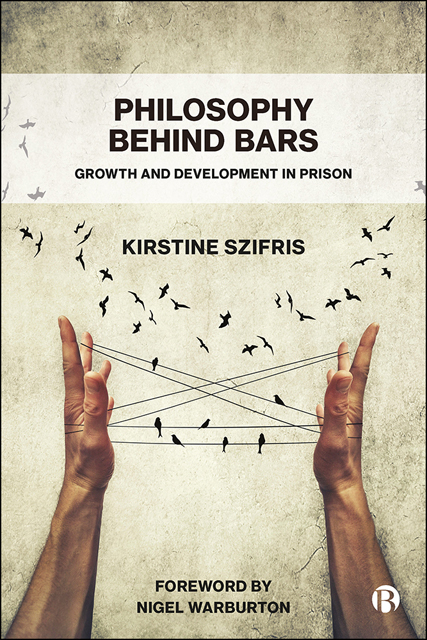Book contents
- Frontmatter
- Dedication
- Contents
- List of Boxes
- Acknowledgements
- Foreword
- 1 Philosophy, Identity and the ‘Ship of Theseus’
- 2 Towards Theory: People, Places and Voices
- 3 Survival, Plato and the Ideal Society
- 4 Kant, Bentham and the Question of Identity
- 5 ‘Why Do You Think That?’ Descartes, Hume and Knowledge>
- 6 Not Just an Offender, But a Person
- 7 Trying to Find a Community of Philosophical Inquiry
- 8 Finding Trust and Developing Relationships
- 9 Personal Self-Exploration
- 10 Towards a Framework for Understanding Philosophy in Prison
- 11 Final Reflections
- Appendix: Technical Methods
- Bibliography
- Index
2 - Towards Theory: People, Places and Voices
Published online by Cambridge University Press: 15 April 2023
- Frontmatter
- Dedication
- Contents
- List of Boxes
- Acknowledgements
- Foreword
- 1 Philosophy, Identity and the ‘Ship of Theseus’
- 2 Towards Theory: People, Places and Voices
- 3 Survival, Plato and the Ideal Society
- 4 Kant, Bentham and the Question of Identity
- 5 ‘Why Do You Think That?’ Descartes, Hume and Knowledge>
- 6 Not Just an Offender, But a Person
- 7 Trying to Find a Community of Philosophical Inquiry
- 8 Finding Trust and Developing Relationships
- 9 Personal Self-Exploration
- 10 Towards a Framework for Understanding Philosophy in Prison
- 11 Final Reflections
- Appendix: Technical Methods
- Bibliography
- Index
Summary
‘Subjectivity guides everything from the choice of topic that one studies, to formulating hypotheses, to selecting methodologies, and interpreting data’ (Ratner, 2002, p 1). This book is not simply a subjective memoir, but an account of a piece of research. This involved systematic pre-, during and post-participation data collection, and took place dynamically alongside delivery of the course. As an ongoing process, analysis included reflection and refinement of data collection tools, ensuring that data provided relevant and focused insights as the research progressed (Foster, 2006). The methodological framework draws on Derek Layder's adaptive theory (1998). Following this framework, as the book progresses, I move between my data and literature to illuminate and illustrate the findings. This chapter provides a brief overview of this process, both with respect to delivery of the philosophy course and with respect to data collection and analysis. A full, more technical account of the research, can be found in the Appendix.
I delivered the course alongside conducting the research. Although such a dual role raises issues around objectivity, taking on both tasks has provided a clear advantage in that I was not simply an objective observer, but also a subjective participant in the research process (LeCompte, 1987). This has enabled me to provide an in-depth account of the course, placing the prisoner-student experience, which I shared, at the heart of the process. The central aim of this research has been to explore what role philosophy might play in the prison environment, and to do this through a consideration of identity. In doing so, the aim is not to demonstrate philosophy's superiority over other programmes or courses, but to highlight how it can be complementary, and also, in what ways it might ‘work’. I focus on mechanisms, developing theories around the ‘how’ and ‘why’ of philosophy education as well as outlining ‘what it does’. I prioritize the role of philosophy for the individual as I am interested in the role of education in developing the whole person.
At the outset, no literature was available regarding the use of philosophy education in prisons. This research has therefore been aimed at theory-building, and draws on a range of data collection techniques to build a picture of the meaning and practice of philosophy in prison.
- Type
- Chapter
- Information
- Philosophy behind BarsGrowth and Development in Prison, pp. 23 - 38Publisher: Bristol University PressPrint publication year: 2021

